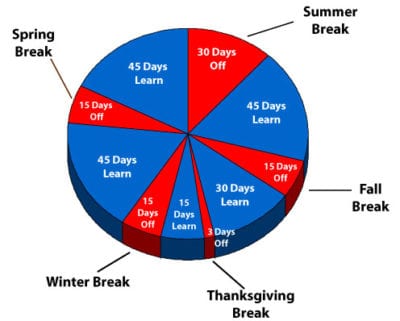Time to Learn: Revisiting the School Calendar Debate

The nine-month school calendar that emerged over a century and a half ago has proven resistant to change. It remains the predominant organizational structure within which learning takes place today, despite significant social, economic, and cultural changes over the past century that could have resulted in alternate ways to structure time for learning. Still, most school districts continue to organize learning around a 180-day, 6-hour school calendar, with summers as a period of limited or no district-sponsored learning activities.
One explanation for the present school year is that it follows the 19th-century agrarian calendar, freeing up youth to work on farms during the summer months. Other explanations include the notion that children should not be exposed to the discomfort of early 20th-century, factory-like, non-air-conditioned school buildings in the summer.
Missing from these explanations for a nine-month calendar, however, are discussions that focus directly on student learning and achievement, which should be at the forefront of conversations focused on schooling. The propensity to naysay an alternate or modified school calendar routinely includes an array of non-achievement-based concerns. Issues such as family vacations, costs, use of facilities, extracurricular activities, teacher and administrator stress, and even the summer-recreation industry too often enjoy parallel positions of importance.
Students in the U.S. spend fewer days in school than their counterparts in many industrialized countries. In Japan, for example, students attend school 243 days a year, and academic learning does end not once the school day is over. The school day is extended, as many students attend Juku, which are privately run afterschool services that primarily focus on academic subjects, although some provide tutoring in the arts and sports.
Public schools involved in extended learning time efforts provide a U.S. version of a Juku; albeit one that is public and available to all students. They recognize that the amount and quality of time does influence learning, and their efforts result in improved learning and achievement for a number of children. Even though extended learning programs may primarily focus on low-performing, high-poverty schools, given the international achievement gap, all schools should keep a close eye on the success of these schools.
Extension to the school day is important, but extension to the school year is important as well. Research suggests that not only do achievement gaps develop when children from low socioeconomic backgrounds are away from school, but the rate of these gaps accelerates during the summer months. Comparable achievement occurs during the school year for children from both backgrounds.
During periods away from school, however, skills for children from higher socioeconomic backgrounds continue to grow, while no such advances occur for children from low socioeconomic backgrounds. Evidence suggests that modified calendars have a positive impact on achievement for students from low socioeconomic backgrounds, and thus should remain a viable option for schools seeking to improve achievement for students living in low socioeconomic environments.
Clearly, a structure for learning is needed that restores our stature as a well-educated nation and contributes to our ability to be a major player on the global economic playing field. Just as important, we need to provide enough time for learning so that young people have an education that allows them to grow into competent and confident adults able to choose how to live their lives. Holding on to a rigid traditional school calendar seems imprudent when viewed in light of such goals. Historically, supplemental schooling experiences to the nine-month calendar have existed. The time is ripe to flip the arrangement, so that the traditional calendar becomes supplemental to more effective arrangements of time for learning.
Click here to read all our posts concerning the Achievement Gap.




